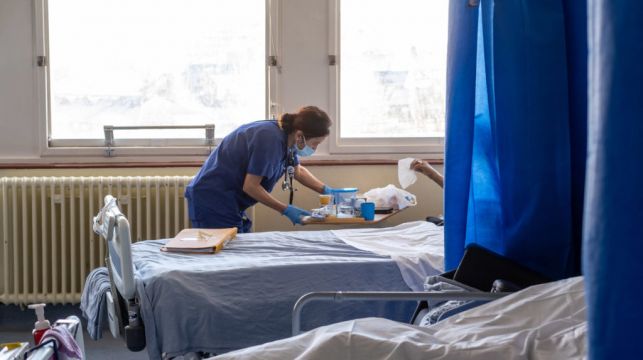At least 10 assaults happen at Irish hospitals every single day, an Oireachtas committee has heard.
Representatives for the Irish Nurses and Midwives Organisation (INMO) appeared before a Joint Committee on Health on the Welfare and Safety of Workers in the Public Health Service on Wednesday, calling for greater supports to ensure the safety and welfare of its members.
In her opening statement, INMO General Secretary Phil Ní Sheaghdha told the committee that over 9,000 assaults occurred between January 2021 and October 2022 — almost double the figure recorded by the HSE.
Paediatric nurse Sylvia Chambers told the committee hearing that she — like many of her colleagues — does not feel safe in her workplace.
“I can say I have never experienced aggression like we have in the past few years, particularly on a daily basis,” Ms Chambers, who is employed at a busy Dublin hospital, said.
“There are a numerous of incidents where we are verbally attacked, I have been spat at. I have been verbally abused. I have been threatened that when I leave work that evening, I will be stabbed as I get into my car. I have had grown man six foot four towering over me throwing objects at me. It is a daily occurance and I do not feel safe going to work.
Safety concerns
A lack of security measures, overcrowding and under-staffing were some of the reasons outlined by Ms Chambers for the safety concerns held by nurses and midwives working in Irish hospitals.
“Staff are leaving due in bulk because they are stressed. In the last 18 months we've had 30 nurses resign from our emergency department. We are on our knees when it comes to our staffing levels.
“It is it's just not appropriate. We are at our wits’ end. People are leaving because of this and something has to be done,” Ms Chambers said.
This point was backed up by Ms Ní Sheaghdha, who said that an inability to provide safe working environments was affecting the recruitment and retention of nurses and midwives.
“To retain and attract new entrants into the professions, it is essential to consider how the current environment can affect retention and recruitment and the intention to leave,” Ms Ní Sheaghdha said.
Ms Ní Sheaghdha also noted that over 63 per cent of all incidents of assault that occur against HSE workers are levelled against nurses and midwives. “Between January 2021 and October 2022, there were 5,593 reported assaults against nursing and midwifery staff.”
“We also know that many nurses and midwives don’t report incidents of assault. It is not acceptable that in a profession that is overwhelmingly made up of women, that at least ten assaults occur every single day.
“We must ensure that all nurses and midwives working in the health service can do so without a threat to their safety, dignity, and bodily and psychological integrity.”
Responsibility
Ms Ní Sheaghdha stressed that it was the responsibility of the Health Service Executive (HSE) to protect its employees in the workplace, and that the Health and Safety Authority (HSA) should be resourced appropriately in order to carry out investigations into verbal and physical assaults in hospitals.
“According to data from the Health and Safety Authority, HSE staff reported 4,796 workplace related physical, verbal, and sexual assaults in 2021, yet only 446 investigations and inspections took place (HSA, 2021). These statistics cannot be ignored, and urgent action is required.
“The INMO is again repeating our call for a full review and audit of security systems and protocols in Irish hospitals. An audit has not been completed since 2016, and as recent tragic events in the Mercy Hospital have shown, it is time to rectify this situation.”

Overcrowding only exacerbates the already difficult conditions faced by nurses and midwives.
“We often describe our hospitals as pressure-cooker type environments and the circumstances our members found themselves working since last July have borne out this description. Within the acute hospital service, nurses and midwives are working in impossible conditions to provide the safest care possible, but their workplaces are dangerous.
“Basic safety is not guaranteed in understaffed and overcrowded wards and emergency departments. Since July 2022, over 77,141 patients have been admitted to hospital without a bed. The return of consistent overcrowding is significantly impacting the mental and physical health of nurses and midwives,” Ms Ní Sheaghdha added.







